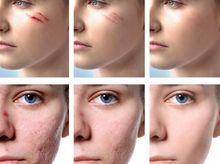Scar Removal in Zenket Soussane
Search and Compare the Best Clinics and Doctors at the Lowest Prices for Scar Removal in Zenket Soussane




































































































































No Time?
Tell us what you're looking for and we'll reach out to the top clinics all at once
What does a Scar Removal Procedure Involve?
There are several types of scar removal techniques available. These include:
-
Laser scar removal – this type of scar removal is noninvasive and is most effective for surgical scars. It involves the use of intense light to reduce the color, shape, and size of a scar. Different types of laser can be used to remove a scar. In general, the laser causes changes to the surface of your skin, allowing new and healthy skin to form at the site of the scar.
-
Dermabrasion – during dermabrasion, a machine that looks like a tiny sander is used to smooth away the top layer of the skin. It is a great way to smooth a raised scar.
-
Chemical peels – with this type of treatment, a chemical solution is placed over the site of the scar. When the chemical solution is removed, a layer of skin lifts away, revealing a smoother layer of skin.
-
Surgical scar removal - this is the most invasive type of scar removal. This type of scar removal is mostly done for deeper scars. During surgical scar removal, a surgeon may take skin from another part of your body (skin grafting) and place it over the scarred area. Skin grafting is usually used for people who have had burns. In some cases, the surgeon may also be able to reduce the size of a wide scar. Surgical scar removal usually involves general anesthesia.
Injections – steroid injections can shrink the size of a scar that rises above your skin, making it even with the surface of the skin. Dermal fillers or collagen can also be used. They work by filling the area around a deep scar.
How Long Should I Stay in Zenket Soussane for a Scar Removal Procedure?
Your length of stay varies depending on the type of scar removal you underwent. For injections, you only have to stay for a few days, usually about 2 to 3 days. For dermabrasion and laser scar removal, it is recommended that you stay in Zenket Soussane for about 5 days. For surgical scar removal, plan to stay at least 7 to 10 days as you need to attend regular checkups. Chemical peels usually require multiple treatments, so your length of stay will be based on the number of treatments you need.
What's the Recovery Time for Scar Removal Procedures in Zenket Soussane?
The duration to bounce back after Scar Removal methods in Zenket Soussane is significantly influenced by the kind of scar elimination process. Less significant treatments like dermabrasion, laser treatments, or chemical peels frequently exhibit a brief recuperation span, fluctuating between a few days up to a week.
You generally have to wait for 1 to 2 weeks until you can resume your normal activities after most types of scar removal. If you choose to undergo injections, you should be able to get back to your normal activities in 24 hours. However, it is wise to avoid strenuous activities, such as intense exercise and heavy lifting.
What sort of Aftercare is Required for Scar Removal Procedures in Zenket Soussane?
After all types of scar removal techniques, your doctor will give you detailed aftercare instructions. The instructions may include how to care for the affected area, medications to take, and restrictions.
You may be advised to avoid sunlight for a few weeks after scar removal. When you have to go outdoors during the day, make sure to cover your skin (such as wearing a wide-brimmed hat) and use a broad-spectrum sunscreen (at least SPF 30). You should also try to elevate the wound while sitting or resting to reduce swelling. It is important that you avoid bumping or hitting the area.
What's the Success Rate of Scar Removal Procedures in Zenket Soussane?
The success rate of Scar Removal protocols in Zenket Soussane is relatively commendable, with numerous patients indicating substantial progress in their scar presentation. Aspects that affect this high efficacy involve the nature and intensity of the scar, the selected protocol, and the person's general health.
It is crucial to maintain practical anticipations because it might be unfeasible to entirely remove a scar. Nevertheless, an accomplished Scar Removal can drastically diminish the scar's prominence, rendering it less discernible. It is recommended for patients to converse about their treatment objectives and probable results with their medical practitioner before taking part in the protocol.
Are there Alternatives to Scar Removal?
You can try over-the-counter or prescription gels, ointments, or creams. These products can be used to make scars caused by cuts or other injuries appear less noticeable. Over-the-counter products are a great solution for minor scarring. If you have severe scarring, ask your dermatologist for advice.
Additional options encompass methods like micro-needling, a process that involves the insertion of small needles into the skin to incite the production of collagen, or dermal fillers, which serve to elevate indented scars to the plane of the neighboring skin. For those dealing with hypertrophic or keloid scars, the administration of steroid injections could serve as a potent treatment strategy.
This information has been accurately sourced and verified by a medical professional for its accuracy, however, we strongly recommend you to consult with your doctor before pursuing medical procedures overseas.




